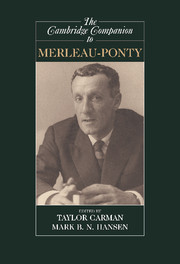Book contents
- Frontmatter
- Introduction
- 1 Merleau-Ponty and the Epistemological Picture
- 2 Sensation, Judgment, and the Phenomenal Field
- 3 Seeing Things in Merleau-Ponty
- 4 Motives, Reasons, and Causes
- 5 Merleau-Ponty and Recent Cognitive Science
- 6 The Silent, Limping Body of Philosophy
- 7 Merleau-Ponty and the Touch of Malebranche
- 8 A Phenomenology of Life
- 9 The Embryology of the (In)visible
- 10 Merleau-Ponty’s Existential Conception of Science
- 11 Between Philosophy and Art
- 12 Understanding the Engaged Philosopher: On Politics, Philosophy, and Art
- 13 Thinking Politics
- References
- Index
10 - Merleau-Ponty’s Existential Conception of Science
Published online by Cambridge University Press: 28 May 2006
- Frontmatter
- Introduction
- 1 Merleau-Ponty and the Epistemological Picture
- 2 Sensation, Judgment, and the Phenomenal Field
- 3 Seeing Things in Merleau-Ponty
- 4 Motives, Reasons, and Causes
- 5 Merleau-Ponty and Recent Cognitive Science
- 6 The Silent, Limping Body of Philosophy
- 7 Merleau-Ponty and the Touch of Malebranche
- 8 A Phenomenology of Life
- 9 The Embryology of the (In)visible
- 10 Merleau-Ponty’s Existential Conception of Science
- 11 Between Philosophy and Art
- 12 Understanding the Engaged Philosopher: On Politics, Philosophy, and Art
- 13 Thinking Politics
- References
- Index
Summary
Maurice Merleau-Ponty is best known as a philosopher of science for his detailed investigations of psychology. Perhaps because of this, the significance of his work for a broader philosophical reflection on science has been overlooked, but Merleau-Ponty intended his work as a general investigation of the epistemological and ontological status of meaning and structure. The structures discovered through research in solid-state physics or molecular biology must be included within the scope of his inquiry as much as the more primary perceptual structures of color or visual depth. It is true he often insisted that science cannot account for or understand a particular phenomenon and went on to contrast his phenomenological discoveries with the inadequate analyses produced by science. When Merleau-Ponty spoke of “science” in this way, however, he used the term interchangeably with “objective thought.” The task remains to show that scientific investigation can also be freed from the traditional prejudices of objective thought and exhibited as a mode of human existence. Merleau-Ponty was admittedly ambivalent about this possibility, and he rarely thematized scientific research in the course of his investigations. The aim of this chapter, however, is to develop an existential conception of science within the context of Merleau-Ponty’s work. It seems clear to me that his project cannot be completed unless it incorporates science, and not just the body and the perceived world, poetry and history, painting and love.
- Type
- Chapter
- Information
- The Cambridge Companion to Merleau-Ponty , pp. 265 - 290Publisher: Cambridge University PressPrint publication year: 2004
- 4
- Cited by



